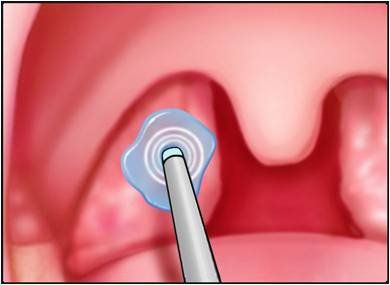This is an automatically translated article.
Peritonsillar abscess and peritonsillar inflammation are the most common acute pharyngeal infections in adolescents and adults. Symptoms of peritonsillar abscess include severe sore throat, hoarse voice, tightness in the jaw, and displacement of the uvula. If not treated in time, the abscess around the tonsils can lead to dangerous complications.1. What is an abscess around the tonsils?
Abscesses around the tonsils are often a complication of tonsillitis or strep throat. This is a bacterial infection with a pus-filled sac near one of the tonsils.Abscesses around the tonsils are common in children, adolescents, and young adults. However, this condition is quite rare because patients are usually treated completely with antibiotics, avoiding complications of abscesses.
2. Symptoms of abscess around the tonsils
Peritonsillar abscess is a complication of tonsillitis or strep throat, so the symptoms will be similar to these two conditions. Manifestations of peritonsillar abscess include:Infection occurs in one or both tonsils. Fever with or without chills. Difficulty opening the mouth wide. Difficulty chewing food. Difficulty swallowing saliva. Swelling of the face or neck. Headache. The voice was muffled. A sore throat is usually worse on one side. Swollen lymph nodes in the neck or jaw that are often painful to the touch. Ear pain on the same side as sore throat. Halitosis. In addition, abscesses around the tonsils can cause serious complications, such as:
Lung infections. Airway obstruction. The infection spreads to the throat, mouth, neck, and chest. Abscess abscess. If left untreated, an abscess around the tonsils can cause infections throughout the body and even block the airways.

Hạch xuất hiện ở vùng cổ do áp xe quanh amidan gây ra
3. Abscess around the tonsils when to see a doctor?
If you have a sore throat accompanied by fever or other symptoms, see your doctor promptly for an accurate diagnosis.In addition, if you have a sore throat and difficulty swallowing, difficulty breathing, difficulty speaking or signs of airway obstruction, you should quickly go to the hospital to avoid life-threatening.
4. Causes of abscess around tonsils
As mentioned above, a peritonsillar abscess is a complication of tonsillitis. When the infection spreads to the area around the tonsils and forms an abscess.Infectious mononucleosis as well as tooth and gum infections can also cause abscesses around the tonsils. In rare cases, an abscess around the tonsils may be caused not by an infection but by inflammation of the salivary glands.
5. What methods help diagnose abscess around tonsils?
First, to diagnose a peritonsillar abscess, your doctor will examine your throat and mouth. Your doctor may then ask you to do a blood test or take a sample of your throat to confirm the diagnosis. Signs that help diagnose a peritonsillar abscess include:Swelling on one side of the throat. Swelling on the roof of the mouth. Redness and swelling in the throat. Enlarged lymph nodes on one side of the neck. In addition, your doctor may also recommend that you have a CT or MRI scan to get a better look at the abscess. The doctor also takes a sample of the abscess fluid with a needle to determine if there is an infection.
6. Methods of treating abscesses around the tonsils
Usually, the doctor will prescribe antibiotics to treat abscesses around the tonsils. In addition, the doctor may also drain the abscess to speed healing. Depending on the stage and symptoms, the doctor will give different treatment methods:The stage of peritonsillar inflammation is an intermediate stage between acute tonsillitis and peritonsillar abscess. During this period, it is only necessary to use antibiotics in combination with anti-inflammatory, antipyretic and pain relievers according to the dose prescribed by the doctor. When the abscess around the tonsil has pus, the treatment method is to make an incision in the abscess to drain the pus, keep the incision open for about 3 days; combined with medical treatment with intravenous antibiotics or intravenous infusion, using drugs against both aerobic and anaerobic bacteria; along with that is taking anti-inflammatory, pain-relieving, fever-reducing drugs,... If you can't eat or drink, your doctor can give you fluids. If your throat is very sore, your doctor may give you a pain reliever. Your doctor will ask you to have your tonsils removed if the abscess recurs to avoid possible more serious complications.

Chích rạch khối áp xe quanh amidan
7. How dangerous is an abscess around the tonsils?
Abscesses around the tonsils usually clear up and cause no complications with proper treatment. However, if left untreated or improperly treated, an abscess can lead to serious complications such as:Obstruction of the airways. Loss of water. Infection in the jaw, neck, or chest. Sepsis . Pneumonia . Meningitis . Endocarditis.
8. Prevention of abscesses around the tonsils
The simplest and most effective method to prevent abscesses around the tonsils is to limit the risk of tonsillitis and pharyngitis such as: Don't smoke, maintain good oral hygiene and treat oral infections properly. way.Please follow the website: Vinmec.com regularly to update many other useful information.
Please dial HOTLINE for more information or register for an appointment HERE. Download MyVinmec app to make appointments faster and to manage your bookings easily.













